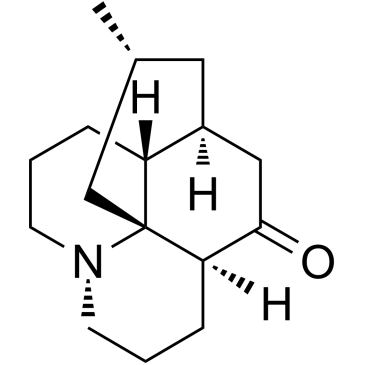Lycopodine |
| Catalog No.GC36516 |
La licopodina, un componente bioactivo farmacolÓgicamente importante derivado de las esporas de Lycopodium clavatum, desencadena la apoptosis mediante la modulaciÓn de la 5-lipoxigenasa y la despolarizaciÓn del potencial de la membrana mitocondrial en células refractarias de cÁncer de prÓstata sin modular la actividad de p53. La licopodina inhibe la proliferaciÓn de células HeLa mediante la inducciÓn de la apoptosis mediante la activaciÓn de la caspasa-3.
Products are for research use only. Not for human use. We do not sell to patients.

Cas No.: 466-61-5
Sample solution is provided at 25 µL, 10mM.
Lycopodine, a pharmacologically important bioactive component derived from Lycopodium clavatumspores, triggers apoptosis by modulating 5-lipoxygenase, and depolarizing mitochondrial membrane potential in refractory prostate cancer cells without modulating p53 activity[1]. Lycopodine inhibits proliferation of HeLa cells through induction of apoptosis via caspase-3 activation[2]. Caspase-3
Lycopodine (5.22-78.3 μg/mL; 12 hours) has 50% viability at 57.62±0.086 μg/mL and 51.46±1.43 μg/mL for PC3 and LnCaP, respectively[1].Treated with Lycopodine (74-222 mM; 12 hours), the apoptotic index is with respect to the gradual increase in doses for the PC3 and LnCaP cells[1].Lycopodine (74-222 mM; 12 hours) induces cell cycle arrest at G0/G1 phase in PC3 and LnCaP cells[1].Lycopodine (0-200 µg/mL; 48 hours) shows cytotoxicity to HeLa cells in a dose and time dependent manner. However, Lycopodine shows minimal cytotoxic effects in normal peripheral blood mononuclear cells (PBMC) even at the highest dose (200 µg/mL)[2].Lycopodine (100, 200 µg/mL; 24 hours) increases level of Bax and decreases the mitochondrial cytochrome c. This is followed by an increase in expression of cytochrome c in cytosolic fraction. Lycopodine also cleaves the caspase-3 in the total cell lysate, while the expression of Bcl-2 is down regulated[2]. Cell Viability Assay[1] Cell Line: PC3 and LnCaP cells
[1]. Bishayee K, et al. Lycopodine triggers apoptosis by modulating 5-lipoxygenase, and depolarizing mitochondrial membrane potential in androgen sensitive and refractory prostate cancer cells without modulating p53 activity: signaling cascade and drug-DNA interaction. Eur J Pharmacol. 2013 Jan 5;698(1-3):110-21. [2]. Mandal SK, et al. Lycopodine from Lycopodium clavatum extract inhibits proliferation of HeLa cells through induction of apoptosis via caspase-3 activation. Eur J Pharmacol. 2010 Jan 25;626(2-3):115-22.
Average Rating: 5 (Based on Reviews and 5 reference(s) in Google Scholar.)
GLPBIO products are for RESEARCH USE ONLY. Please make sure your review or question is research based.
Required fields are marked with *




















